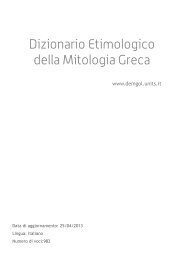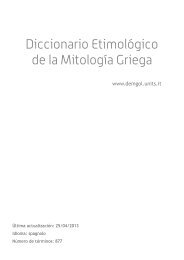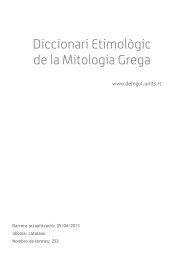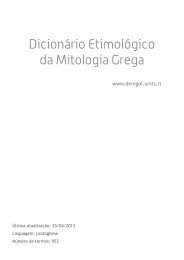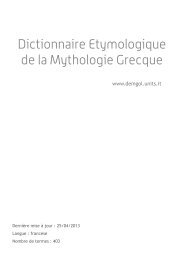Etymological Dictionary of Greek Mythology - Dizionario etimologico ...
Etymological Dictionary of Greek Mythology - Dizionario etimologico ...
Etymological Dictionary of Greek Mythology - Dizionario etimologico ...
Create successful ePaper yourself
Turn your PDF publications into a flip-book with our unique Google optimized e-Paper software.
<strong>Etymological</strong> <strong>Dictionary</strong> <strong>of</strong> <strong>Greek</strong> <strong>Mythology</strong> - www.demgol.units.it<br />
The name derives from the <strong>Greek</strong> verb θάλπω, "to warm, kindle" (Chantraine, DELG and Frisk, Gr. Et. Wört., s. v.<br />
θάλπω), and thus means "he who burns, is warm".<br />
Ξανθίππη<br />
XANTHIPPE<br />
Name <strong>of</strong> an Amazon, daughter <strong>of</strong> Doros, wife f<strong>of</strong> Pleuron and mother <strong>of</strong> Agenor (Apollod. Bibl. 1, 7, 7). Another<br />
Xanthippe, daughter <strong>of</strong> Mycon, was supposed to have nourished her incarcerated father by her own breast milk, Hygin.<br />
Fab. 253, 3.<br />
The name derives from ξανθός, "blond, fair-haired", and ἵππος, "horse"; therefore it means "(possessed) <strong>of</strong> a tawny<br />
mount", with a possessive sense, or simply "tawny horse", an appropriate name for an Amazon.<br />
Ξάνθος<br />
XANTHOS<br />
A frequent name <strong>of</strong> men and horses, such as: 1. The immortal horse <strong>of</strong> Achilles, given to Peleus by Poseidon, who was<br />
given the ability to speak by Hera in order to inform the hero <strong>of</strong> his coming death (Hom. Il. 19, 404-424), 2. One <strong>of</strong><br />
the horses belonging to Hector (Hom. Il. 8, 184-190), 3. One <strong>of</strong> the horses <strong>of</strong> the Dioscuri (Stesich. Fr. 178.1, vv. 2 P.,<br />
apud Etym. Magnum s. v.), and finally 3. One <strong>of</strong> the horses <strong>of</strong> Diomedes, king <strong>of</strong> Thrace (Hygin. Fab. 30, 9). It is also<br />
the name <strong>of</strong> a Nereid, in the feminine form in -ή, Hesiod. Theog. 356.<br />
The name derives from ξανθός, "blond, fair-haired" (attested as an anthroponym already in Mycenean: ka-sa-to, PY<br />
An 39.6), etymology unknown. Frisk (Gr. Et. Wört., s. v. ξανθός) and Pokorny (Indog. Etym. Wört., p. 533) doubt its<br />
relation to the root kas-, kas- no-, "gray", Lat. canus, with the ending -dho- and disappearance <strong>of</strong> the root syllable<br />
*ks-en-dho: but this derivation does not seem plausible in sense or form. Hester ("Lingua" 13, 1965, p. 361) suggests a<br />
Pelasgian origin from *keu-, *k+u x or *kand-, Lat. candidus.<br />
Category: Kinds <strong>of</strong> animals<br />
Theme: Prophecy<br />
Ξοῦθος<br />
XOUTHOS<br />
Son <strong>of</strong> Hellenos and Orseis (var. l. Otreis), brother <strong>of</strong> Doros and Eolos, father <strong>of</strong> Ion (actually fathered by Apollo) and<br />
Achaios, who gave their names to Ionia and Achaia (Hesiod. Fr. 9 M.-W.; Hellan. Fr. 125 Fowler; Apollod. Bibl. 1, 7, 3).<br />
Derived from the adjective ξουθός, with subsequent barytonesis (retraction <strong>of</strong> the accent) onto the penult. The<br />
adjectival ending -θος has many meanings, at times contradictory, cf. Etym. Magn. s. v.: senses <strong>of</strong> the adjective thus<br />
range from "tawny" or "greenish" to "melodious" (perhaps by metaphorical transposition). The word is clearly attested<br />
in Mycenean, Ko-so-u-to, KN Ch 900, and seems to be the name <strong>of</strong> a bull or a description <strong>of</strong> its coat. Treated as an<br />
12



